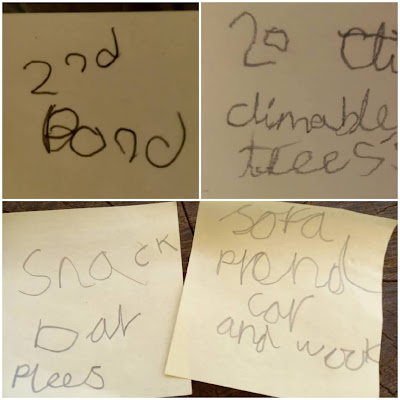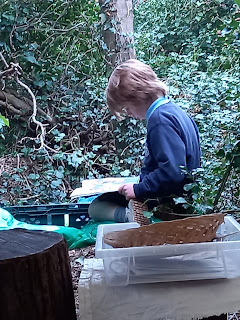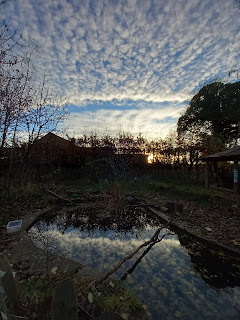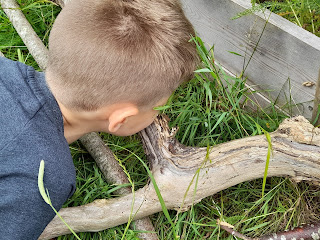Evidence
Because Forest School is more of a pedagogy than a subject it is difficult to 'prove' and track 'progress' in the way the education system expects.
As always the type of setting and what is provided will influence this, and there are ways to document activities and demonstrate increased knowledge, but when based in a school often the developments are inside the classroom and not out at basecamp! If our aim is to foster curiosity, build resilience, and create a better attitude to learning, we will never know how well it is working without feedback from class teachers.
I have a 'Progression of Skills' sheet which I use as a list that ensures I cover all skills across a year. The children are invited to investigate each activity, supported in learning, and able to revisit independently or supervised (depending on the activity), but participation is not mandatory! For the last year, ALL our Primary Pupils have been having Forest School sessions, that's approximately 350 children, and there is no way I can keep even a tick chart on every child!
Outdoor Learning usually comes with a learning intention that is easier to track and evaluate. The class has something to focus on and active involvement, as well as achievement, is simple to monitor. With the independence of Forest School and its child-led focuses, showing that an improved attitude to learning is influenced by sessions is always going to be impossible without a control group!
Luckily more and more evidence is being published to support what those of us involved in Outdoor Learning AND Forest Schools witness: the children respond differently, and are more engaged outside.
Written observations and photographs are great at noting changes in behaviour and attitudes within Forest School, as well as providing evidence of what experiences the children are participating in. Mental notes, scribbled sentences and a good chat with the children at the end of a session will feed into your understanding of how things are progressing.
I bypassed the chat this week and provided post-it notes and a noticeboard for children to write or draw what they like about Forest School - or what they don't like! What would they like to change? What should we alter? What would they LIKE to do...?
 |
| Dens. More swings. Some tunnels to cool bits. More paths. |
 |
Lots of requests we will be able to spend this term developing together. With their input and ideas. Some requests may take a little longer!
 |
| 2nd Pond. 20 climbable trees. Snack bar. Sofa, pretend car & wool. |
They were under no obligation to add to the noticeboard, and many didn't! It is something I will do again. I have a feeling that having it constantly available would make it part of the furniture and overlooked, but it will be popping out regularly.
The children have asked for more tunnels and paths, climbing and swings, bird boxes, and dens. There's been a lot of ' I love Forest School' messages, a few specific requests (including for '20 climbable trees'!), and even some appreciation for what we have achieved so far!
 |
| I like Forest School because of how much you did in it/work hard to make it. |
All of their feedback, as well as what we have observed while watching them engage with the activities outside, will be used to steer what we do next.
Different classes enjoy different things. Some spend a lot of time at basecamp doing activities that need adult support or supervision, others disappear off to their own games and leave the adults wandering slowly to make sure everyone is OK! Within the classes there are smaller groups who really enjoy focusing on different aspects of Forest School. One class splits into about 5 groups. One which will avidly dig, one which will play chase games, one that has turned litter picking into an extreme sport, one that makes dens, and with the remaining few flitting between the others. Other classes ignore litter picking. Some are focused on woodwork. One seems to be intent on getting every child up a tree during their session! The digging area is always popular, for the mud kitchen, and for the fun of creating holes and channels. This week digging up flint rocks led to discovering fossils (the circles are from a sea urchin shell there when the flint formed a very, VERY long time ago!) Something we couldn't plan for and had to adapt to quickly!The needs and support changes with each class. Sometimes it's 4 classes a day, and trying to provide activities that will differentiate easily can be tricky!
Photos are my personal preference. When I look at them I can almost always recall the exact situation and why I took it. I upload them to Twitter or the school Facebook page with a quick sentence... which also helps to contextualise the moment when I look back at the end of the week. Short video clips can be just as useful.
When I took on my current role I was told that quite a lot of children didn't like Forest School, they didn't like being cold or wet, and some had very low expectations because older siblings had told them it was a miserable time! All of which I perfectly understand! We have gone from trepidation to mud monsters. We've been out in rain, hail, fog, and winds on the verge of reaching the point of cancellation. We've been out in 35oC degrees of heat and in ankle-deep snow. All of it has at times been challenging.
The classes still arrive with enthusiasm. The children rarely complain about anything. During this week's feedback I told all of them that this was their chance to say anything about Forest School, even if it was just 'I love Forest School', or 'I hate Forest School'. To which a chorus of year 1s replied 'Why would you say THAT?!'
The pupils are happy to participate, of course they have 'off' days, and other circumstances creep into the mix, but we don't have to deal with complaints about having to actually do forest school.
That in itself is evidence of something. Of children's engagement, of their connection to being outside, of their willingness to explore, investigate, experience and enjoy.
They frequently demonstrate all that and more!
The child in the video designed his fishing rod, then devised things to pick up. A version of 'Hook the Duck' was born. He asked for advice, he asked for help, he shared his ideas and plans. He assigned the 'ducks' a score based on how easy it was to hook them. Each needed troubleshooting, palm drills used to make holes and sticks chosen for shape and size, often whittled, to fit in. They needed to balance too! He then helped his classmate make her own rod and join in, encouraging her to test the new 'duck' and assign a score. When others came along and asked to join in, he explained the game.
Where do you start with the list of learning shown here?!
What more can I ask of them!?








Comments
Post a Comment